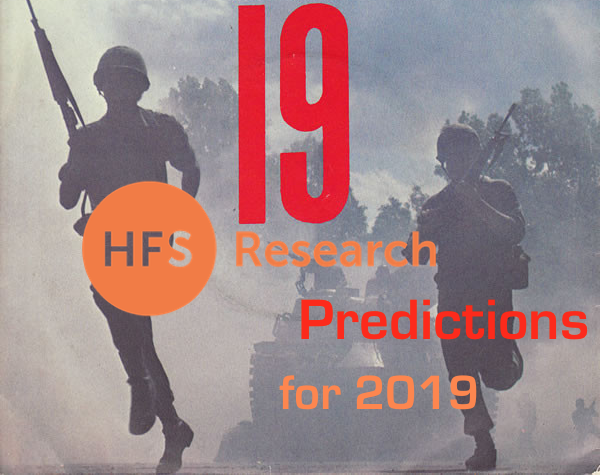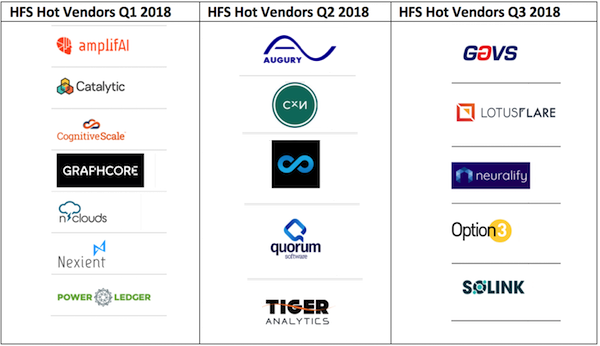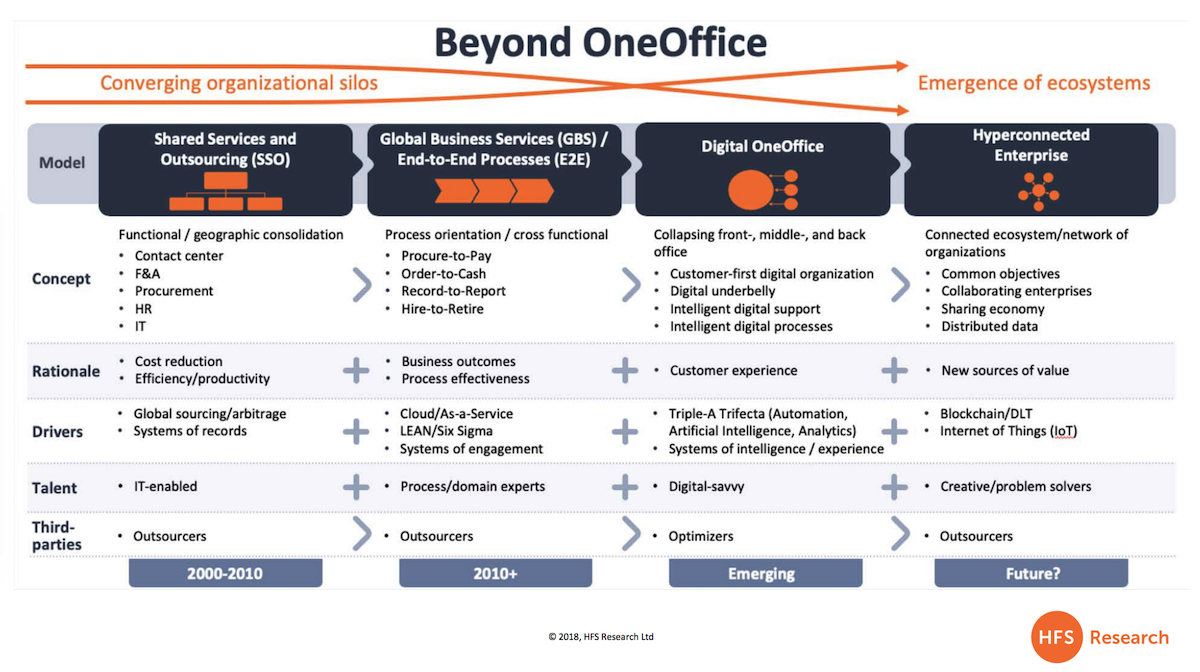
Each year we promise no more predictions but it’s a habit we just can’t kick. So have 19 of them from the HFS research team…
“OneOffice” becomes reality. Organizational silos around front, middle and back-office will continue to erode in 2019 to create a boundary-less organization where there is only one office that matters – and that is the office that caters to the customer. The triple-A trifecta of automation, artificial intelligence, and smart analytics is helping ambitious organizations reach their OneOffice goals at a much faster pace.
The Hyperconnected enterprise beyond OneOffice will emerge. As organizational silos converge, ecosystems will start to develop and a “Hyper-Connected Enterprise” will emerge. These B2B networks will be driven by collaboration across multiple organizations with common objectives around driving completely new source(s) of value. The emergence of blockchain and Internet of Things (IoT) is starting to make this vision of a shared economy with distributed and trustworthy information a reality.
The term “Digital” becomes so diluted, it is rendered meaningless as “Integrated Automation” drives the narrative. In the race to call everything “digital”, digital will start to mean nothing. Integrated automation across the HFS Triple-A Trifecta of Automation, AI, and Smart Analytics will drive the industry conversation in 2019.
The misplaced faith in “retraining” will fade. We will continue to see uncertainty and confusion on changing job roles due to the impact of automation and AI. This is clearly a much longer conversation than just 2019. But as more enterprises get their hands dirty with various technologies, reality will set in and we will at least retire the misplaced faith in “retraining” as the panacea to all talent management challenges. We will also see an increased focus from ambitious talent putting themselves through nanodegrees (such as Udacity) and other discrete training opportunities as the pressure builds to stay relevant in the face of emerging tech.
2019 will be the year of ‘how’. The why (customer experience, revenue impact, internal alignment) and what (emerging technologies) for transformation are now fairly clear after intense debate for the last couple of years. But “how” to go about executing on the aspirations is still a black hole. There will be many disappointments as exponential expectations are met with linear execution. Execution requires integration in every sense of the word – technology, talent, organizational change and leadership to achieve scale and deliver exponential benefits.
Success will be defined by effective digital change management versus digital adoption. There is an increased realization that simply throwing money at a new technology will not yield the desired results, but spending time in developing a method to the madness will drive success.
Emerging technologies
“Big iron” software firms will enter the RPA market. They have ignored RPA far too long and we saw SAP starting to make a move in 2018 acquiring a little-known RPA product Contextor. In 2019, mega ISVs such as Microsoft and/or leading systems of records like Oracle will acquire some RPA product challengers such as Kofax, Softomotive, Redwood, or Workfusion. The big three (Automation Anywhere, Blueprism, and UiPath) will likely remain untouchable.
RPA-as-a-service will get traction in 2019. RPA solutions will become increasingly function or process-specific to help enterprises scale. Today they are far too task specific. The push towards greater process and function focus will enable broader solutions and necessitate complementary technology integration like ML and NLP. RPA will certainly start to be smarter and the solutions will look more like the custom solutions coming from the service providers.
AI as a term will get tiresome and we will revert to something more meaningful. This is heading towards more combined applications of foundational AI building blocks to solve specific business problems. One of the “big four” mega-ISV firms (Amazon, Google, Microsoft, IBM) will pull ahead (likely Microsoft) in the AI arms race because of their deep investments and partnerships to offer the most comprehensive marketplace for enterprise AI deeply tied to cloud migration.
AutoML and XAI will gather momentum. If AI is to have true business-ready capabilities, it will only succeed if we can design the business logic behind it – and hence the need to design “explainable AI,” or XAI. The AutoML movement will also see traction as technology continues to become more accessible, resulting in a host of new companies getting started with AI despite limited resources.
Blockchain will come out of the closet as ecosystems across organizations that service the specific needs of a customer start to emerge. No single organization owns the entire customer experience and competitors and peers will have to start to figure out how to collaborate. Blockchain will provide the way to make it happen.
Cybersecurity will become a C-level priority versus the current mid-level management headache. Most enterprises understand the importance of securing their data but lack of C-level management commitment to effective investment is a key inhibitor of an enterprise’ security readiness. This will (hopefully) change in 2019.
Most enterprises and providers will realize that they will never be ‘cloud-only’ due to legacy workflows dependent on traditional on-premise kit. Cloud providers opening up the technical debt further by running towards newer more efficient platforms – migrating from one to the other is a pipe dream. Assuming the pipe is loaded with crack!
The smart providers will invest more in hybrid cloud platforms to help clients simplify the growing (expensive) chaos of multi-cloud environments. More so now due to the increased differentiation of hyperscale players forcing clients to build relationships with all of them for best in breed cloud.
Open-source technologies embed further into enterprise becoming a pillar of the modern technology stack. As CIOs are pushed to avoid lock-in to expensive and rigid proprietary tech.
Emerging players to watch in 2019
HFS Hot Vendors. Niche players with differentiated value propositions for the OneOffice will continue to proliferate. We will be keenly watching how the 17 HFS Hot Vendors profiled in Q1-Q3 2018 perform in 2019 (also watch out for the Q4 edition of HFS Hot Vendors in the new year)

Service Provider Landscape
Several traditional service providers will merge as market for services becomes unsustainable for so many commodity firms – right across business process and IT lines. Expect M&A activity involving the likes of Conduent, DXC, and NTT Data which all currently suffer from lack of market differentiation.
Large commodity call centers lose to smaller more nimble contact center players. Large commodity players have done precious little to add value beyond the FTE model will lose to smaller contact center vendors that have invested in premium tech services (such as RPA and chatbots) and nearshore delivery in their portfolio.
The boundaries between service offerings will blend into each other. Consulting and managed services will get diffused. The big 4 will start to offer more managed services and the leading SIs will continue to invest and expand their advisory services. “Fr-enemy relationships” will start to get established!
Posted in : Blockchain, intelligent-automation








Great insights Phil Fersht. Bringing all this new technolgies and models to work together and deliver on the business outcomes, will require Execution and Integration. Thanks for the great articles in 2018, looking forward to read more of them in the new year ????
Add a 20th: HFS will be the indisputed number analyst firm that leads new thinking and ideas!
Digital and Ai are quickly becoming catch all phrases. It is time to hold a mirror. Who else can do it better than hfs? Direction setting perspective.
Phil – Good article
Integrated automation is a nice term. I do believe automation will always be a means to get to business outcome Y, for CEOs automation is not the goal it is only a means to the desired outcome. I think executives will start looking at Digital as a means to deliver insights which will allow CXOs to drive agility, experience, efficiency and effectiveness and in turn achieve their goals. The ROI on digital will remain important for CXOs to embrace it more. Firms that will be able to contextualise this value to CXOs will continue to do well in the Digital space.
Anshul
Phil and team – thorough and much more relevant than some of the other visionaries out there! Keep them coming in 2019
Paul
Happy exciting 2019 ..Integrated Automation it is ..and as a service ..thank you for articulating nagging thoughts into firm outlook ..very good article
very insightful – thanks for sharing, Phil.